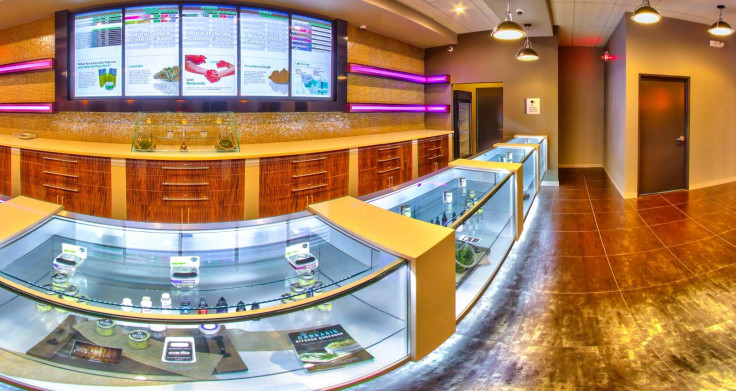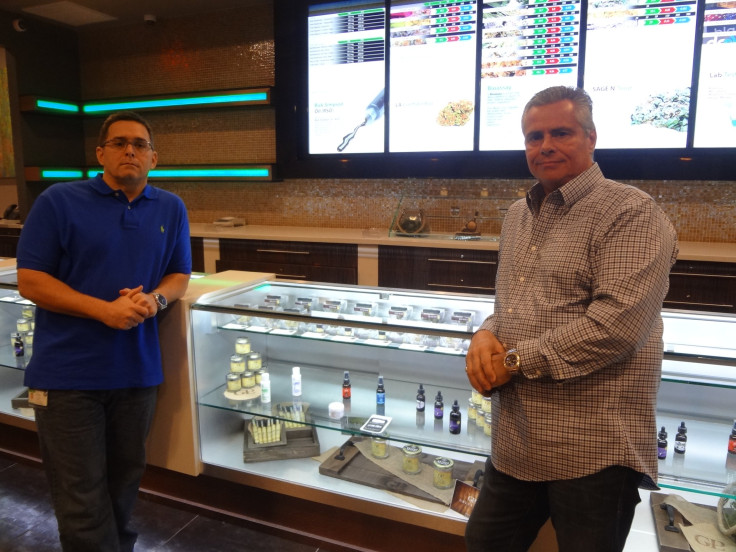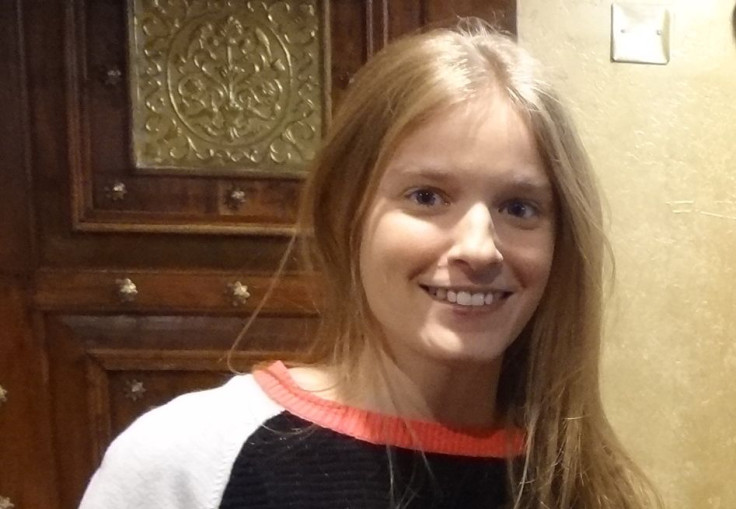Medical Marijuana Has Arrived In Las Vegas, But Will All The Rules Harsh Sin City's Buzz?

LAS VEGAS – Las Vegas Releaf prides itself on being the Bellagio of medical marijuana dispensaries. Located in a strip mall just off the famed Las Vegas Strip, the operation’s 3,700-square-foot interior is filled with polished, luxurious details: dark-wood surfaces, bronze accents, shimmering tiled walls. An audio system emits relaxing jazz tunes as budtenders, dressed in all black, stand at the ready. LED light bars behind the counter shift between hues of neon, and bright oversized flat screens on the walls broadcast deals and marijuana factoids, like the origins of the term “Rick Simpson Oil.”
But there’s one thing Las Vegas Releaf is missing compared to its casino counterparts: the crowds.
Most days, the operation is fairly quiet. Even early November’s Marijuana Business Conference and Expo, the industry’s largest national trade show, didn’t significantly boost sales. While Las Vegas Releaf was the first dispensary to launch in the city of Las Vegas, just 10 customers showed up for its October grand opening.

Thanks to strict city rules around marijuana, the dispensary has struggled to let potential customers know that it’s up and running, much less where it’s located. Among other restrictions, Las Vegas Releaf can’t be listed on the strip mall’s main billboard alongside the names of its neighbors, like a 7-Eleven, a nail salon and a massage parlor.
“We have had a lot of downtime,” says Michael Hayford, co-owner of Las Vegas Releaf. “But at least we’ve been able to keep the store really clean.”
Such is the world of Nevada’s new approach to medical marijuana. Passed by legislators two years ago and rolled out over the past several months, the state’s dispensary system is the first in the nation to offer reciprocity, meaning that medical marijuana cards issued anywhere in the country are honored in the state. In other words, while officials in other states like Colorado are loath to even acknowledge the existence of cannabis tourism, Nevada is actively courting medical marijuana patients visiting from other states. A legalization initiative already approved for next year’s ballot will double down on making the state – in particular Las Vegas – the country’s top marijuana destination.
“This is a city where people come to let their hair down and have fun. I cannot imagine a better match for cannabis tourism,” says Joe Brezny, executive director of the Nevada Cannabis Industry Association . “We have legalized gambling, we have legalized prostitution, we regulate vice quite well here.”
But in a place like Nevada, regulating vice comes with a lot of rules. Nevada officials have encumbered their new medical marijuana regime with some of the most stringent policies and controls in the nation. This is how the state keeps its celebrated indulgences safe and professional, but it’s also how its communities – and businesses that have sprung up to keep those indulgences in check – make money. The results are myriad bureaucratic hassles, a cannabis scene controlled by those with the most money and connections, and local medical marijuana patients concerned that the system benefits everyone but themselves.
The situation illustrates one of the main points of tension for the growing marijuana industry nationwide: How do you adequately regulate a substance long seen as taboo while also giving bourgeoning businesses the flexibility and support they need to flourish and grow? If Nevada can’t solve this conundrum, could all those high rollers who’ve already bet big on making getting high part of the state’s celebrated hedonism end up losing their shirts?
Regulatory Hurdles
While Nevada voters legalized medical marijuana in 2000, the law was extremely restrictive, requiring patients to grow their own marijuana but not specifying how they could legally obtain seeds or clones to do so. That changed in 2013 when the state legislature passed a bill legalizing dispensaries and other aspects of a fully functioning medical marijuana industry.
The law, which allowed for up to 66 dispensaries statewide, was notable because of its reciprocity measure. Honoring other states’ medical marijuana cards fit with Nevada’s history of building its industries – and tax revenues – around those who live elsewhere. According to Derek Connor, a Las Vegas attorney who represents a variety of local medical marijuana businesses, Nevada’s in-state medical marijuana population, which recently exceeded 12,000 patients, will likely top out at around 60,000 people. (Nevada counts 2.8 million residents, roughly half the population of Colorado.)
That’s not much to build an industry around, but the equation changes once you factor in out-of-state travelers. According to official records, last year 1.1 million Americans had medical marijuana licenses, or roughly .34 percent of the total population. If that same fraction of Las Vegas’ 41 million annual visitors have their marijuana cards and use them, the 40 dispensaries allowed to open in the area could be looking at another 140,000 potential customers a year. That number could be just the beginning as more and more states legalize medical marijuana. One industry insider predicted the Las Vegas cannabis market alone, where up to 40 of the state’s dispensaries could be located, might reach $1.5 billion annually .
At Las Vegas Releaf, reciprocity has already helped. Hayford and co-owner Al Fasano say approximately half of their customers are from out of state. But getting to this point wasn’t easy. “It’s been a long, hard, two-year process of regulatory hurdles,” says Fasano. That process began with applying for licenses in unincorporated Clark County, the area outside of Las Vegas proper that encompasses the Las Vegas Strip, for a dispensary, grow facility and marijuana production facility. Despite the fact that they were able to demonstrate $250,000 of liquidity and a sustainable financial plan for each of the three potential licenses, as required by the state, Hayford and Fasano weren’t among the 18 applicants granted dispensaries by the county.
Hayford and Fasano then joined forces with several other rejected county applicants, including a prominent area attorney, owners of a major local bar chain and the son of two former Las Vegas mayors. “This isn’t about a couple of friends who scratched up some money and bootstrapped a storefront with some old cabinets,” says Hayford. They found their current location within Las Vegas’ city limits, then applied for a dispensary license from the city.

This time they were successful, but the hurdles were far from over. The ensuing regulatory process involved more than a dozen inspections and $175,000 in total fees to the city, county and state. Those costs didn’t include the million-plus the operation spent on other business expenses.
“I am optimistic about where it’s all headed, but I would be lying to say I haven’t been frustrated for my clients,” says Connor. “They have been bleeding money for years and many aren’t open yet.”
Las Vegas Releaf also had to contend with special rules adopted by the city of Las Vegas for dispensaries within its limits. Those regulations included limiting the amount of shelf space the dispensary could devote to paraphernalia such as pipes and rolling papers, banning the sale of branded attire and severely restricting the size and location of the store’s signage.
“They didn’t want to see these businesses to look like head shops,” says Hayford. But in a locale known for attention-grabbing spectacles and giant neon signs, the regulations could be causing Las Vegas Releaf to lose business to the smoke shop located across the street, not to mention the various local marijuana “delivery services” listed on websites like Leafly and Weedmaps that aren’t regulated but so far haven’t faced legal crackdowns.
“Does the community know we are open?” asks Hayford. “Can the community differentiate between a legal operation and an unregulated, illegal opportunity?”
The further a Nevada dispensary is from the bright lights of Las Vegas, the less regulatory challenges it seems to face. Inyo Fine Cannabis, located a few minutes down the road from Las Vegas Releaf, is located in unincorporated Clark County, meaning it doesn’t abide by the same city rules. It’s why it might just have “the biggest cannabis sign in the world,” says Greta Carter, a partner at Inyo, gesturing at the giant logo above the door of the dispensary. (While Clark County has since passed some signage restrictions, Inyo’s sign was produced before the rule’s implementation, meaning it was grandfathered in at its current size.)
And on the other side of the state near Reno, in the city of Sparks, Silver State Relief launched with little difficulty on July 31, the first dispensary in the state to do so. “When we were approved by the state, Sparks basically rubber-stamped everything,” says Silver State Relief owner Sonny Newman.
Back near the Strip, Las Vegas Releaf has big plans to increase business. Hayford and Fasano aim to soon launch delivery services, another facet of the state’s dispensary program that seems designed to court tourists staying in the big hotels. Plus they’re petitioning the city to ease up on signage restrictions. They already know the slogan they’ll use on their first billboard: “Don’t gamble with your meds.”
Expensive Medicine
Meghan Farrell is dependent on medical marijuana to function, if not to survive.
The 33-year-old Las Vegas resident began experiencing serious gastrointestinal issues in 2009 that left her exhausted and unable to eat. She dropped 60 pounds, lost most of her hair, was forced to quit her job as a teacher. Farrell became bedridden before doctors discovered the culprit: gastroparesis, a rare condition that involves partial paralysis of the stomach. One of the few treatments that seemed to help was cannabis. Smoking or vaping marijuana is far from a miracle cure, but at least on marijuana she manages to eat enough food that she’s no longer in danger of being hospitalized for malnutrition. “It’s just amazing,” says Farrell, sitting at an Indian restaurant, where she dines on plain chicken and rice. “I’m doing a ton better.”
But while Farrell might seem exactly like the sort of patient Nevada’s new medical marijuana rules are designed to help, she hasn’t yet visited a dispensary, because she can’t afford to. With prices at Nevada dispensaries hovering at around $60 to $75 for an eighth of an ounce--roughly twice the going rate in Colorado--Farrell would have to spend her entire $400 social security check each month to cover the cost of her intake.
“People had no idea the marijuana was going to cost that much,” says Clark County Commissioner Steve Sisolak, who helped develop the county’s medical marijuana rules. “It’s double what people thought it was going to be.”

For the time being, Farrell is sticking with the method she’s long used to procure marijuana – a method she prefers not to detail. For years, law enforcement hounded those in Nevada’s nascent medical marijuana scene: knocking on the doors of activists quoted in the press, raiding dispensaries that were set up before the legislature created official rules in 2013. Farrell has enough on her plate without courting legal scrutiny.
It’s not just high prices that frustrate Farrell. As part of the state’s new medical marijuana system, most medical marijuana patients who live within 25 miles of a dispensary will lose their ability to grow their own marijuana next year, meaning the one option patients had to obtain marijuana under the state’s old medical marijuana program will be taken away. It makes Farrell feel like Nevada’s new approach to medical marijuana is designed to cater only to patients who don’t call the state home. “The laws are designed to make money, not to benefit patients,” she says.
One reason for the high prices could be product-analysis expenses. Nevada adopted rigorous medical marijuana testing standards, requiring every five-pound batch of marijuana to be tested for potency and a variety of contaminants, rather than simply testing one sample from each lot that’s harvested, as many states dictate. These rules could help Nevada avoid the sort of product recalls currently plaguing the Colorado marijuana market, but it’s also led to a booming testing-lab industry. There are currently five marijuana labs operating in Clark County, or one for every dispensary, and each charges between $650 to $900 per sample tested. James Dean Leavitt, president of the Las Vegas-based MM Lab and president of the newly created Nevada Cannabis Laboratory Association , argues that the cost of these tests equals only about two percent of the total retail price of each five-pound lot. But it’s still a cost passed on to consumers.
As the state’s medical marijuana industry grows, product costs will likely come down. That’s among the aims of Silver Sage Wellness, a Las Vegas area operation that recently got its 6,000-square-foot grow facility up and running and aims to open its dispensary in early 2016. “We’re going to be a little cheaper than everyone else right now,” says Braly Joy, Silver Sage’s general manager. “There’s a lot more to this than just making money.”
Denver On Steroids
Joe Brezny, head of the Nevada Cannabis Industry Association, sits at a bar at the Rio hotel and casino in early November, nursing a Bloody Mary and a hangover. All week he’s been participating in the Marijuana Business Conference and Expo, where during the day 5,500 cannabis entrepreneurs and experts from all over the country learn about new industry opportunities and peruse the latest marijuana technologies. At night, attendees flock to invitation-only parties hosted by big-name cannabis brands in rooftop suites, where the views are sweeping and the drinks flow freely. “I’ve drunk more this week than I have all year,” says Brezny.
While personal vaporizer pens, easy to sneak on a plane, are a common sight among the crowds, Brezny, the one-time head of the Nevada Republican Party and former director Mitt Romney's presidential campaign in the state, would prefer marijuana consumption to be a more candid and official element of the revelry. It’s why he’s spearheading Nevada’s marijuana legalization initiative , which has already been certified for next November’s ballot.
Legalized marijuana in Nevada would build on efforts to cater to out-of-state visitors. “I want to make this the marijuana capital of the world,” says Tick Segerblom, a Democratic state senator who’s actively supporting marijuana legalization efforts. “If you look at Nevada, that is who we are. We are a rogue state. Whatever happens here stays here.”

Brezny’s legalization initiative allows local governments to permit marijuana consumption at marijuana retailers, meaning Nevada could be among the first places in the country to develop cannabis cafés along the lines of Amsterdam. Colorado Cannabis Tours , a marijuana tourism company, has already purchased the web domain SinCityCannabisTours.com, which it will put to use once legalization passes. “I think our [Colorado] tourism numbers are going to be cut in half by Nevada’s market,” says company founder Mike Eymer.
Obstacles remain before Las Vegas becomes “Denver on steroids,” as Segerblom describes it. Sheldon Adelson, CEO of Las Vegas Sands Corp, has donated millions to anti-medical marijuana efforts in Florida , and while he declined an interview request, insiders say the billionaire will mount a similar offensive against cannabis legalization in his home state. (Seberblom, for one, welcomes Adelson’s involvement: “If Sheldon Adelson is the face of our opposition, we are going to win,” he says. “People in southern Nevada don’t like him.”)
Then there are the casino operations themselves, which by state law aren’t allowed to get into the cannabis business, and so therefore have little incentive to back legalized marijuana. “To make it simple, gambling doesn’t like people taking all those $20 bills and putting them into something other than their poker tables, restaurants and slot machines,” says Connor, the Las Vegas attorney.
Still, many people are optimistic that soon enough, Nevada will allow everyone – locals and visitors alike – to use marijuana. That includes longtime local marijuana activist Jason Sturtsman. While Sturtsman advocates for patient rights as a as part of the organization Wellness Education Cannabis Advocates of Nevada and is lobbying to keep testing requirements reasonable as a member of the state’s Independent Lab Advisory Committee, he’s also working as a part-time manager at Las Vegas Releaf and welcomes the Las Vegas-ification of cannabis. Even if that means exacting regulations and an industry dominated by the rich and powerful, he believes the payoff nationwide will be worth it.
“When people from Middle America and the South come to Las Vegas and see dispensaries and are able to try recreational marijuana for the first time, they will bring the experience back with them to some of the most conservative places in the country,” he says.
Then, he adds, “It will all be over.”
© Copyright IBTimes 2025. All rights reserved.





















